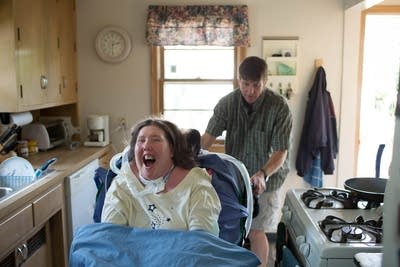Minn. personal care assistants divided by union question
Go Deeper.
Create an account or log in to save stories.
Like this?
Thanks for liking this story! We have added it to a list of your favorite stories.

Mark Kirwin cares for his wife Christine at home, where her worsening multiple sclerosis requires he get help from nurses and use a lot of medical equipment.
It's a labor of love. But is it also labor that should be unionized? That's the question Kirwin and 12,000 care providers in various Minnesota taxpayer-supported programs may soon answer.
In-home personal care assistants, who work with elderly and disabled people, have been quietly moving closer to a vote on whether to form a union. A law passed in the spring opened the door to union efforts among personal care assistants and state-subsidized child care providers.
While the child care fight has been more public, the divisions are no less deep among people who spend much of their time caring for loved ones.
Turn Up Your Support
MPR News helps you turn down the noise and build shared understanding. Turn up your support for this public resource and keep trusted journalism accessible to all.
Kirwin, who's been caring for Christine for more than 20 years in their northeast Minneapolis home, gets the money he needs to help with her care through a state program called Consumer Directed Community Supports. He thinks union representation will help people like him and could also help protect a program that can save the state money by caring for people in their own homes rather than in more expensive nursing homes.
"I think a lot of people have trouble understanding the value of home care workers," he said. "They've never had to face this type of situation, having to choose between going to work and providing care for a loved one. So, they don't really see the value in it."
PCA RANKS DIVIDED
The Service Employees International Union announced its campaign to organize personal care assistants (PCAs) and other direct support workers shortly after last fall's election, when labor-friendly Democrats won majorities in the Minnesota House and Senate.

The resulting bill that DFL Gov. Mark Dayton signed into law in May authorized the PCA vote to move forward, as well as the separate effort to unionize some in-home child care providers.
There are passionate advocates and harsh critics within the PCA ranks.
Catherine Held of Burnsville cares for her nine-year-old daughter Charlotte, who has a genetic disorder. Held said she doesn't want anything to do with a union or paying union dues. "I'm her mom, and the unionization, it doesn't make -- who am I going to unionize against? Who am I going to bargain with? Who am I going to barter with?" she asked. "It doesn't make any sense to me. And all that's going to end up happening is the money that my daughter gets because she's special needs is going to go in the union's pocket instead of being used for her."
Union opponents went to court this summer to try to stop the child care provider part of the union law from moving forward. A federal judge dismissed the two cases, but one is being appealed.
The PCA effort has not encountered any similar hurdles. But Held said that could be changing soon.
"I've actually been in touch with other PCAs and that is our plan, that we would also seek to file a federal lawsuit to stop the unionization efforts," Held said.
LOW-WAGE, HIGH TURNOVER WORK
Not all PCAs care for their own family members, and it's a low-wage, high-turnover job. Jamie Gulley, president of the union group SEIU Health Care Minnesota, said collective bargaining is a way to address what he views as a "workforce crisis," by making the profession more attractive at a time of growing demand for such services. Gulley said he's not concerned about any potential lawsuits.
"It's no surprise there are some individuals in the state of Minnesota that are just anti-union and don't think that anyone should be allowed have a union, much less PCAs. But right now, we're not too worried about that. We're really focused on talking to PCAs about what kind of future they want for this profession."
Gulley said SEIU is now waiting for the Minnesota Department of Human Services to compile a list of all current PCAs who would be eligible to vote in a union election.
The union can proceed with an election once they've collected the signatures of 30 percent of the eligible PCAs.
Dear reader,
Political debates with family or friends can get heated. But what if there was a way to handle them better?
You can learn how to have civil political conversations with our new e-book!
Download our free e-book, Talking Sense: Have Hard Political Conversations, Better, and learn how to talk without the tension.




